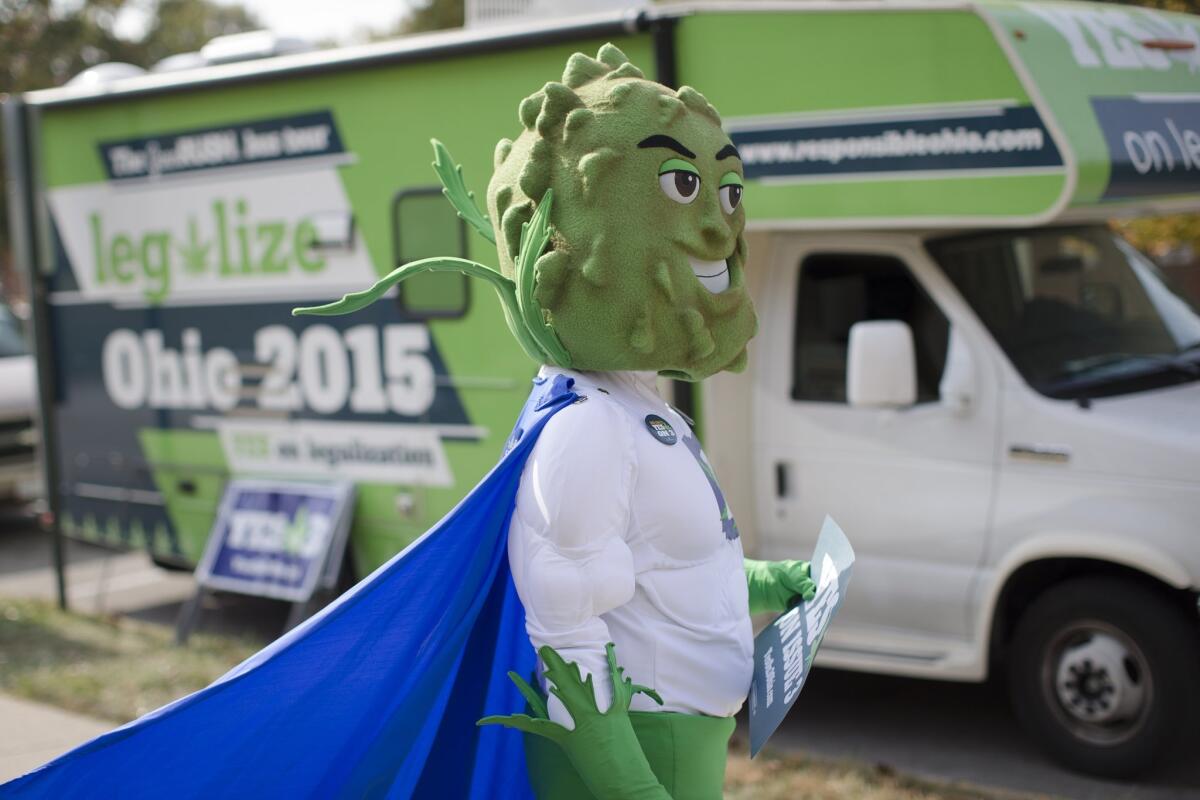Why Ohio’s pot legalization vote is being watched so closely

Buddie, the mascot for the pro-marijuana legalization group ResponsibleOhio, waits to greet passing college students during a promotional tour stop at Miami University in Oxford, Ohio.
- Share via
Ohio voters are going to the polls Tuesday in a tight battle over whether to legalize the sale of marijuana for medicinal or recreational use.
The ballot initiative is being watched closely for a number of economic, cultural and political reasons, including the national impact it could have on future pot referenda.
Here is a primer to understanding the complex issues.
What will voters decide?
Voters will be asked to decide whether Ohio should become the fifth state in the nation to legalize the sale of marijuana, which is still a federal crime. Washington, Oregon, Colorado and Alaska plus the District of Columbia already allow the sale of pot for recreational and medicinal use. Nineteen states allow pot sales only for medicinal reasons, according to ProCon.org, a nonprofit, nonpartisan group that researches controversial issues.
What do we know of the electorate’s mood?
A recent Bowling Green University poll showed a dead heat, with 44% in favor, 43% opposed and 13% saying they were undecided. There is a margin of error of plus and minus 3 percentage points.
What makes the Ohio referendum different?
In the public mind-set, there has been a distinction between allowing pot to be used as a pain-easing drug and legalizing it for recreational uses. States like Colorado and Washington, for example, first had well-established medicinal marijuana use before legalizing it for recreational use. If Ohio’s constitutional amendment passes, it would mark the first time that voters approved both forms of usage at the same time.
Why is the Ohio case culturally different?
Other electoral battles have, in part, involved supporters from the 1960s hippy era who saw marijuana as an easy substitute for an alcohol-sodden culture. If legalization passes, Ohio would become the first culturally conservative Midwestern state to approve the sale of pot, an indication of how far the drug has grown from its roots in the counter-culture.
Is there anything unique about the Ohio law on the ballot?
The Ohio measure limits the cultivation and selling of pot to 10 pre-determined farms. That means that anyone wanting to sell marijuana — if it is legalized — must buy it from one of those 10 farms. In essence, the measure sets up a public pot monopoly, critics charge.
Who are among the 10 suppliers?
The owners are 24 investors, including famous Ohioans who make the Buckeye State proud.
They include former NBA star Oscar Robertson, generally regarded as one of the greatest athletes of the 20th century, who played collegiate and professional ball in Cincinnati. It includes descendants of William Howard Taft — Ohio’s own — who is the only person to have served as both president and chief justice of the United States.
Investors also include Nick Lachey, former boy band celebrity, multiplatinum musician and ex-husband of Jessica Simpson whose marriage was the stuff of tabloid legend and reality television.
What is the investors’ involvement worth?
If the measure passes, the various groups would be on the threshold of a $1-billion-a-year industry. As part of the electoral process, each group reportedly was asked to invest between $2 million and $4 million that went to the group backing the referendum, the ResponsibleOhio campaign.
Is everyone on board?
No. The idea of an investment group paying to run a campaign to pass a constitutional amendment that will make them very rich has caused problems for some Ohio lawmakers.
In July, state lawmakers approved their own ballot initiative that would ban anyone from creating a constitutional amendment exclusively for financial gain.
What happens if both measures pass?
The next stage for this drama likely will be the courts.
Follow @latimesmuskal for national news.
More to Read
Sign up for Essential California
The most important California stories and recommendations in your inbox every morning.
You may occasionally receive promotional content from the Los Angeles Times.











